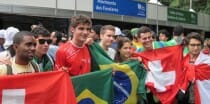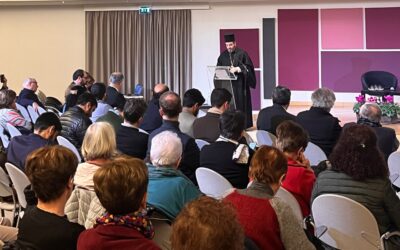 A municipal counselor, group leader of the majority party of Mar del Plata, Argentina, found herself face to face with two young people who introduced themselves as activists of the opposition. Curious, she received them in her office. The two simply explained that they wanted to assure her of their respect for her opinions, but that they wanted to exercise their role in the opposing party in a constructive manner. Surprised by the rather unusual declaration she asked them where they had learned to carry out this type of politics. The two explained that they were students of a school of the Political Movement for Unity Politico (MPPU). A short time later, also the municipality counselor started to attend the MPPU’s local school of politics.
A municipal counselor, group leader of the majority party of Mar del Plata, Argentina, found herself face to face with two young people who introduced themselves as activists of the opposition. Curious, she received them in her office. The two simply explained that they wanted to assure her of their respect for her opinions, but that they wanted to exercise their role in the opposing party in a constructive manner. Surprised by the rather unusual declaration she asked them where they had learned to carry out this type of politics. The two explained that they were students of a school of the Political Movement for Unity Politico (MPPU). A short time later, also the municipality counselor started to attend the MPPU’s local school of politics.
Chiara Lubich may not have come to know about this tiny episode, amid the thousands of incidents many other MPPU members of many countries could recount. And yet, we could surely consider this as a typical effect of the encounter with the ideas and spirit of the charism of unity Chiara had spread and which has taken as its paradigm, the ideal of universal brotherhood. In what way? By preparing citizens, and thus civil society, sensitive to the life of the political community they are part of, in short, through active citizenship.
Going back the Movement’s history, in the “Mariapolis” held in Primiero Valley in summer 1959, for two months. At different moments, a total number of 12,000 people from 27 countries of the five continents had spent some time in the Mariapolis, and in those days, Chiara had affirmed: “These are the times in which all peoples will have to cross their confines to look beyond, and the time has come for us to love the country of others as our very own.” Given the fact that the effects of the tremendous world conflict were still visible, those were ardent words that inspired new relationships between peoples and governments. Even today, loving the other’s country as one’s own is a daring idea, a guideline for action, starting from the weakest and the poorest.
Philadelphia (USA), 2003. During “Interdependence Day” that took place in that city, Chiara wrote in her message: “From different points of the earth, today we hear the cries of abandonment of millions of refugees, millions of starving people, millions of exploited and unemployed people who are excluded and “cut off” from the political body. It is this division, and not only the hardships and economic difficulties, that makes them even poorer, and augments their desperation. Politics will not reach its aim if it does not respond to its vocation, and for as long as it will not rebuild unity and heal the open wounds in humanity’s political body. »But to reach this goal, fraternity is necessary, because «liberty and equality, in face of the present challenges and the future of humanity alone are not sufficient (…). For as long as fraternity will not be an integral part of the political plans and processes in every region of the world, equality and liberty will always be incomplete and unstable.»
Chiara’s ideas are not just mere words, but the fruit of experience of a Movement which, in developing, extended its gaze over the world, and made the “joys and hopes, the sadness and the anguish of man today, its very own.”
It is therefore civil society, founded on the citizens driven by the spirit of fraternity, that will give the extents and contents to liberty, equality and fraternity, the three pillars of our civilization.
Testo integrale: Politics for Unity




0 Comments